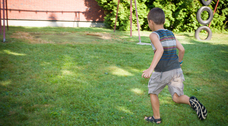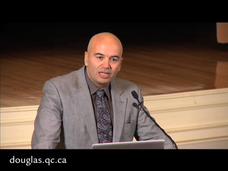
All of us occasionally struggle to focus, sit still, or restrain our impulses. But people with Attention Deficit Disorder with or without hyperactivity (ADHD) wrestle with them every day. ADHD can cripple self-esteem, and a person's ability to function in family, social, work and school situations. Thankfully, through improved treatments and education, more people than ever before are finding relief for ADHD symptoms.
What is ADHD ?
ADHD is a neurobiological disorder that makes it difficult for people to control their behavior and/or pay attention. It is usually diagnosed in childhood and often lasts into adulthood.
Mini-Psych School videos
| ADHD children: when should you take action? (2010) | |
Watch other Mini-Psych School lectures.
Symptoms of ADHD
The primary symptoms of ADHD are focusing difficulties, hyperactivity (excessive activity), and impulsivity (acting before considering the consequences). The behavior must be excessive, appear before age 7, and seriously handicap at least two areas in a person's life (home and school, for example).
The three main categories are:
- Inattentive: difficulty focusing or staying focused on a task or activity
- Hyperactive-impulsive: excessive activity and impulsivity
- Combined: focusing problems plus excessive activity and impulsivity
Who is affected by ADHD?
- 3 to 5% of children have an ADHD
- Boys are three times as likely as girls to be affected
- ADHD touches people of all ages (including adults)
Usually, it's only over time that it becomes clear that certain children are not just daydreamers or extraordinarily active – that they are, in fact, handicapped with a medical disorder. This is because children with attention disorders exhibit the same behaviours seen in any normal child, except that their behaviors are exagerated, and debilitating. Children with ADD have a neurobiologically-based disability that causes them to be inappropriately inattentive, and, in some cases, inappropriately impulsive for their age. Many have poor short-term memories, difficulties in completing tasks, and problems with intrusiveness.
Sleep problems are also common. Falling within in this category are children who daydream incessantly. They find it almost impossible to stay with the task at hand, which can have devastating consequences for their school performance. Because these children are not disruptive, they can also be harder to spot and treat. They are often found sitting in the back rows of classrooms, gazing out the windows. Teachers may think they're “slow”. Chances are they're not.
Those who have ADHD, as opposed to ADD, have the additional challenge of being hyperactive (inappropriately active for their age). In a constant physical whirl of unfocussed activity, they dart from here to there. Critically hampering their ability to achieve goals, this variant of attention disorder can wreak havoc on family, school and social life. ADHD (representing ADD and ADHD) affects two to three times more boys than girls, but the girls who are affected can be impaired as severely as boys. It can place great stress on parents, siblings, friends, teachers, and others closely connected with the child.
Causes of ADHD
Like all mental disorders, Attention-Deficit/Hyperactivity Disorder results from a combination of genetic and environmental risk factors. Several studies have shown that a small molecule responsible for communication between neurons—dopamine—plays an important role in attention, task orientation, and action. In fact, the drugs used to treat attention deficit/hyperactivity disorder increase its level between certain neurons. It is therefore possible that an imbalance in dopamine-related nervous system activities may play a role in the development of attention deficit/hyperactivity disorder.
Since 30 to 40 percent of people diagnosed with ADHD have relatives with the same disorder, genes are thought to be at least partially involved. Although parents, teachers, spouses etc. do not cause ADHD, they can greatly affect the person's ability to cope with their disorder.
Consequences of ADHD

A cruel consequence of these attention disorders is the tendency towards low self-esteem. Not being able to sit still, to wait your turn, to control your ability to focus – all these things make children stand out in a crowd when they don't want to! In addition, most of these children have great difficulty in reading the same social cues that most children learn automatically, so they may inadvertently appear gauche or “weird”. These children also are at greater risk for having additional psychological problems such as anxiety, depression, and conduct disorder (a tendency to be chronically disruptive, disobedient, often aggressive).
As adults, they are at a greater risk for divorce, job conflict and suicide than the general population. Approximately 3-5% of children have ADHD and approximately 50% of those children will carry significant challenges into adulthood.
Fortunately, these children can be very creative, and evolve into highly accomplished adults. Perhaps because their thoughts tend to jump around more than most, they tend to approach problems in unique ways. In fact, Mozart, Einstein and Edison are suspected by many of having an attention disorder. It is important, as well, to realize that the intellectual potential of these children is no different from that of the rest of the general population.
There are lawyers, doctors, school principals – people from all walks of life – who have successfully dealt with their ADHD challenges. Fortunately, many of the problems with social awkwardness, chronic inattentiveness, and intrusiveness often respond well to counseling and group therapy. In addition, if these children are raised in a loving home and have an understanding school environment structured to meet their needs, their chances of having a positive outcome as adults rise significantly
Treatments of ADHD
Available treatments are adapted to meet the needs of the individual child following a biopsychosocial assessment. Treatments include specific medications, psychoeducation, social skills training, special supervision at school, and individual psychotherapy.
Parents may also receive help to better understand attention deficit disorder and improve their parenting skills. This therapy is offered in group sessions on Saturdays or at specialized summer camps.
All children are also assessed to determine their response to drug treatments in terms of both behaviour and possible side effects.
What to do?
If you suspect that someone has ADHD, he should be evaluated by a trained professional. If the person does not have a family doctor, contact the CLSC in your area for directions to an appropriate resource.
Research at the Douglas
The following Douglas scientists specialize in attention deficit disorder research:
[Attention Deficit Disorders: causes, symptoms and treatments] [Attention Deficit Disorders: everyday skills]



